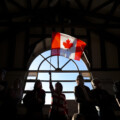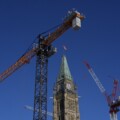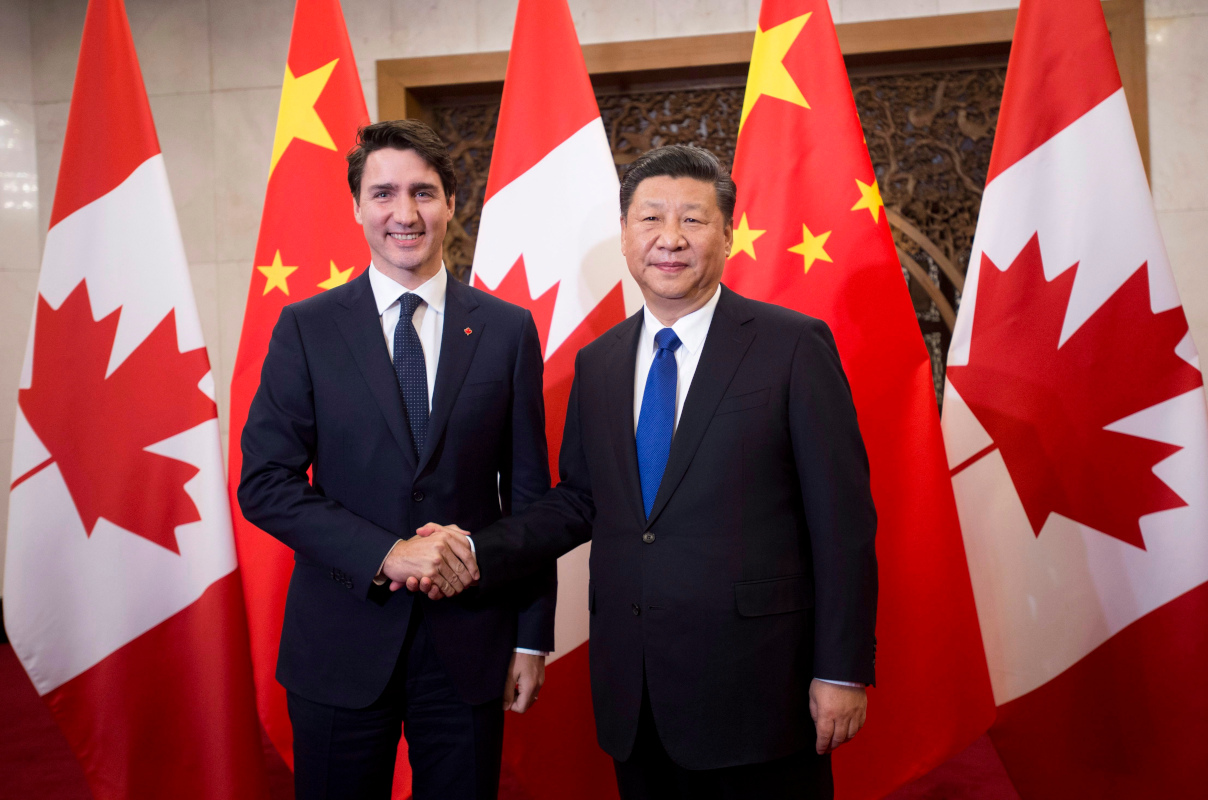The news media in Canada is in crisis. Policy responses to date are failing to solve for the information that citizens need to make informed decisions about important issues and debates. The Future of News series brings together leading practitioners, scholars, and thinkers to imagine new business models, policy responses, and journalistic content that can support a dynamic future for news in Canada.
This month, dozens of politicians, lawyers, intelligence experts, and immigrant diaspora groups descended on Ottawa for another week of the federal government’s inquiry into foreign interference in Canada’s elections and democratic institutions.
It could be powerfully argued that if it wasn’t for journalist Sam Cooper’s reporting, which exposed much of this interference, the inquiry would not be happening at all, and foreign actors hellbent on influencing Canadians would still be hard at work, their pursuits uninterrupted.
It was Sam Cooper who investigated and wrote several breaking stories for Global News about China’s foreign interference in Canadian elections—stories that led to months of allegations of political scandal and serious fallout for the federal Liberal government, which appeared to be the main beneficiary of the interference. These stories included Cooper’s reporting that a Liberal MP privately advised a senior Chinese diplomat that his government should hold off releasing imprisoned Canadians Michael Kovrig and Michael Spavor, that Prime Minister Trudeau was briefed about election interference repeatedly, and his reporting that an Ontario PC MPP was part of an election interference network led by China’s Toronto consulate.

Riding the tsunami wave of these exclusives Cooper left Global to found The Bureau, an online news outlet focussing on domestic and international intelligence stories, which he launched on Substack in June last year. Since then, the new media outlet has been making a name for itself among fans of long-form, hard-hitting investigative journalism.
Consider, for example, the exclusive story The Bureau published last week, under the headline “’Fake Chinese income’ mortgages fuel Toronto Real Estate Bubble: HSBC Bank Leaks.” The story contained details of fraudulent loans doled out by the banking giant to members of the Chinese diaspora to help them purchase expensive homes in Toronto, Vancouver, and other Canadian cities. It’s already had 152,000 people read it.
“I’d never seen leaks or disclosures of this kind from a big bank in Canada,” Cooper confessed to The Hub in an interview.
This is exactly the kind of hard-hitting reporting from unique sources that Cooper, through The Bureau, wants to add to Canada’s shifting media landscape.
The book that helped inspire The Bureau
The idea of starting his own investigative outlet came to Cooper following the release of his book Wilful Blindness: How a Network of Narcos, Tycoons and CCP Agents Infiltrated the West. Reflecting the themes of his reporting, the book details how money laundering, real estate, and Chinese Communist Party operatives in Canada intersect, and the many ways in which our country’s national security has been compromised as a result. Published in 2021, Wilful Blindness debuted at number one on Amazon and became a bestseller.
Nearly three years later, the book sits in the eighth spot on Amazon’s best-seller list for the Organized Crime Biography category. It’s been a remarkable run and made Cooper ultimately realize that this brand of investigative journalism could be the basis of a viable business model.
“I knew that I could launch a digital media platform where I could write in the same detailed and in-depth way,” says Cooper. “I decided I was at a point in my career, along with some success writing a book and entrepreneurial success, that it was time to take a leap of faith and start The Bureau.”
And so, the investigative reporter left Global News, a well-known mainstream media outlet, and jumped into the online entrepreneurial abyss.
Investigative reporting is an attractive niche
It is a challenging time to be starting a new media outlet, let alone when you’re just one guy. In June 2023, Corus Entertainment—the parent company of Cooper’s former employer Global News—laid off almost 10 percent of its employees. Just last week, BCE Inc, the parent company of CTV News, announced it would be cutting nearly 10 percent of its own workforce (5,000 positions) selling 45 of its radio stations, and ending numerous TV newscasts outside of Toronto. It didn’t matter that many of these journalists had impressive source Rolodexes or had broken big stories, they were losing their jobs.
Cooper believes that to be successful, newer and smaller media outlets must have a niche.
“As the world’s advertising-supported media model collapses, we need journalists that can be independent leaders in what they’re best at,” says Cooper. The journalist adds that his growing readership is intrigued by his reporting beats, which include systemic corruption and financial integrity.
Ward Elcock is a former director of the Canadian Security Intelligence Service (CSIS) and former deputy minister of defence. He admits that while plenty of online-only Canadian news outlets have sprung up in recent years, few cover corruption and government misconduct like The Bureau.
“There are other publications that cover those things.” “But nobody that particularly specializes in it that I can think of,” he says.
A 2023 report from Statistics Canada suggested that fewer than one-third of Canadians had a good or great deal of confidence in Parliament as a public institution.
While Elcock says it’s important to have outlets like The Bureau that are willing to dive into government misdeeds the public has come to expect, he stresses that governments often make mistakes, mistakes that shouldn’t always be seen as deliberate misconduct.
“There’s no question that there are things that occasionally get hushed up, there’s no question that people make mistakes, there’s no question that sometimes governments don’t tell the truth,” explains Elcock. “But the idea that it is a perennial problem is one that has taken hold.”
One criticism Cooper has repeatedly faced is that he is merely the go-to outlet for disgruntled intelligence agents who want to anonymously leak their displeasure with the Trudeau government’s lack of action and funding.
Cooper rejects the characterization.
“In Canada, I’m asking for some credibility that people in the intelligence community…have been reaching out to me saying that ‘Canada is a playground for hostile state activity.'” he said in a recent interview on Jesse Brown’s Canadaland podcast. “And they have trusted me and said, ‘You’re not only going to tell the truth, you’re gonna protect my identity…I do an assessment of the people and why they come forward. If I think they have personal career motivations,…and they’re pissed off and that’s why they’re leaking, I’m not gonna publish.”
Cooper says his sources are in fact diverse and not all from the intelligence community, explaining that he also receives supporting evidence from academics, non-governmental agencies, state records, and diaspora groups targeted by authoritarian governments.
He says he’s been called out by questionable critics as an “agent of intelligence.”
“It’s just part of the threats and harassment that reporters and politicians that scrutinize the Chinese Communist Party face,” Cooper tells The Hub.

Subscribers have become crucial to The Bureau’s success
While many new media companies have opted for a non-profit or charity model to ensure they stay afloat, The Bureau is a full-fledged business. It is one of a growing number of outlets hosted on Substack, an online newsletter platform that allows people to create an account with no charge.
While many Substacks are personal-interest blogs, the forum can also be an important first step for new journalism publications. When journalist Bari Weiss quit the New York Times in 2020 over what she described as a lack of ideological diversity, she went her own way, creating an account for herself on Substack. Today, she leads a news website called The Free Press and employs a team of journalists.
Still, others languish on the platform, gaining only a limited following. It remains difficult to break through.
Since Cooper left Global News last summer, The Bureau has become his full-time job. While he initially secured enough funding from investors and supporters to help start the publication and keep it afloat for up to two years, he says it’s new subscribers who have been powering the publication towards greater success.
“My plan was to have enough subscriptions to pay myself as in my former media job [salary], and I’m on course for that,” he says. “When I reach that point where I’m getting paid like a Toronto Star or a Globe and Mail reporter, I will say it’s a success for me.”
Subscriptions to The Bureau are $12 per month, or $130 annually. Those willing to pay $405 can become a “Founding Member.” Free subscriptions are also offered, with limited access to content.
Today, The Bureau, which Cooper runs by himself out of Ottawa, has amassed more than 7,000 followers since 2023. For comparison, another Canadian outlet on Substack, The Line, which offers political commentary and has two journalists running it, has garnered more than 20,000 subscribers (that’s paid and non-paying) since its founding in 2020.
For Cooper, creating a strong subscriber base is just the first step in the site’s development.
“Right now, I’m solidly in the middle of phase one, which is to build up subscriptions to the point where it’s very viable and profitable,” says Cooper.
Attracting top talent is Cooper’s next goal
The second stage of The Bureau’s development will focus on bringing in new talent, both in Canada and abroad. Eventually, Cooper would like to have 10 international writers contributing to the publication.
“I’m trying to build it out and bring other unique writers into The Bureau as contributors in sort of a decentralized…journalism media brand,” says Cooper. He adds that he expects the new additions to be mature and unique writers who will support and peer-review or edit one another.
Since its launch last summer, The Bureau has attracted talent such as National Post columnist Adam Zivo, who wrote a critique of “safe supply” programs in British Columbia. At the moment, however, Cooper still writes the vast majority of the stories published.
Amidst the changing media landscape, Cooper is excited by the success The Bureau has had so far. He says he’s confident there will always be an appetite for hard-hitting, investigative journalism.
“It’s always been a challenging time for the media, ever since I’ve come into it, but it’s also an exciting time right now,” explains Cooper. “I was taking somewhat of a leap of faith and I was calculating that there was a market for this, and I can say, 100 percent, there is a market and there is hope in the media.”
The Future of News series is supported by The Hub’s foundation donors and Meta.
Recommended for You

‘Can we actually be an independent country?’: Michael Ignatieff on the 60th anniversary of Lament for a Nation

Fred DeLorey: Why the NDP may be in even bigger trouble than we think

Michael Geist: Children accessing porn is a problem, but government-approved age verification technologies are not the answer

Daniel Zekveld: Age verification for pornography is not government overreach




